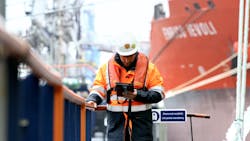UAB-Online out to optimize U.S. liquid bulk supply chain with North American expansion
Netherlands-based UAB-Online is eyeing Houston for the North American expansion of its highly digitized information-exchange service for terminals and vessels in a move the company says will benefit the entire U.S. liquid bulk supply chain.
The software-as-a-service (SaaS) platform enables the efficient exchange of critical pre-arrival information, ship/shore safety checklists, connection and collaboration with all parties, and digital signing of documents—all of which save money, and help ensure compliance with safety and sustainability regulations.
But the real gamechanger for liquid supply chains is in the time savings, the company said.
UAB-Online CEO Hans Bobeldijk told Bulk Transporter his company’s streamlined process saves up to 90 minutes compared to legacy operating procedures, so bulk carriers are loaded and unloaded faster, relieving port congestion, and accelerating deliveries via road and rail. “In this market, where employees are hard to find, it’s always good to optimize processes—and not only your processes, but also those of your stakeholders,” Bobeldijk said.
“By employing our digitized solutions, terminals can reduce the amount of time spent at the berth by completing much of the preparation needed for the loading and unloading operation prior to the vessel’s arrival,” Bobeldijk said. “This will, in turn, significantly reduce vessels’ idle times and their greenhouse gas (CO2 and NOx) emissions at the terminals,” he said.
The company’s expansion plans come after a 2020 update to the requirements outlined in the International Safety Guide for Oil Tankers and Terminals (ISGOTT) guide that made digitizing workflows imperative. In addition to North America, UAB-Online also is aiming for adoption in Asia, key locations where its current clients already have sea-going operations they want the company to manage, Bobeldijk said.
“There are three world hubs important for us at this moment: The Northwest Europe region, the Singapore region, and the Houston region,” he explained. “In Northern Europe we are the industry standard and if we can demonstrate the value of our product in the other two hubs, the rest of the world will soon follow.”
In addition to reducing port stays—and the resulting emissions that count against ports, and all stakeholders in bulk liquid supply chains—UAB-Online promotes regulatory compliance, and the health and safety of employees. “We make it possible to communicate, exchange documents, and obtain signatures in a digital way,” Bobeldijk said. “So you don’t have the safety risks associated with walking through terminals, or contacting other workers, and you save time because control rooms usually are far from the jetties.”
The application’s “smart” functionalities primarily are aimed at ship masters, charterers, terminal operators, surveyors and agents, but its collaborative nature opens it to all interested parties with bulk liquid handling operations, Bobeldijk said. And with wider adoption comes increased optimizations, efficiencies—and further time savings.
“Digitalization is going to have many beneficial effects for local environments, the speed and efficiency of operations, and in driving down costs,” Bobeldijk concluded.
About the Author
Jason McDaniel
Jason McDaniel, based in the Houston TX area, has more than 20 years of experience as an award-winning journalist. He spent 15 writing and editing for daily newspapers, including the Houston Chronicle, and began covering the commercial vehicle industry in 2018. He was named editor of Bulk Transporter and Refrigerated Transporter magazines in July 2020.


